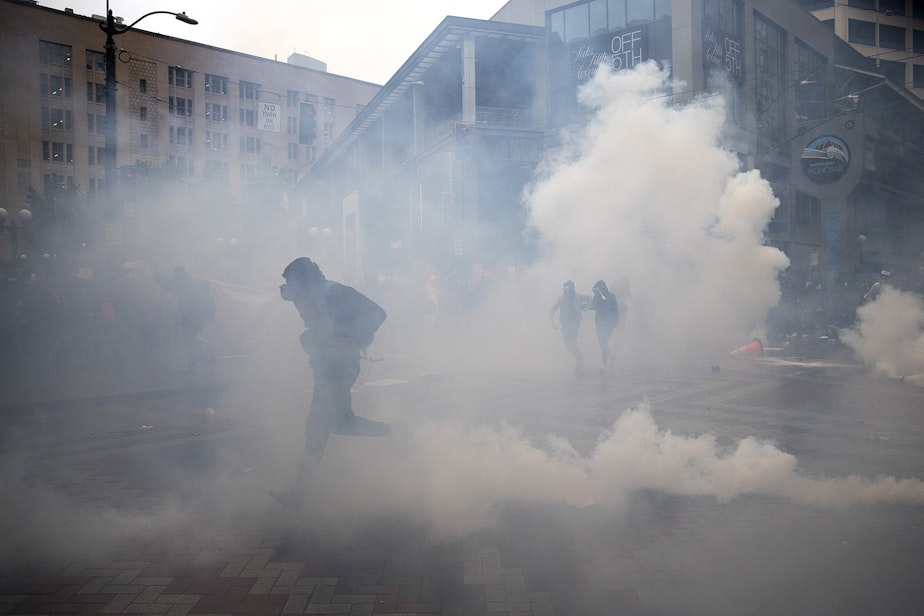Seattle won’t ask the feds to end oversight of the police department, after all

The city of Seattle said Wednesday that it’s halting efforts to get its police department out from under federal oversight.
The decision comes after days of protests over the death of George Floyd in Minneapolis and other Black people at the hands of police. It also comes after complaints about how Seattle officers responded during those protests.
And it capped a day of tumultuous meetings between city officials and the public, including a tense exchange between Mayor Jenny Durkan and Seattle’s Community Police Commission.
Reverend Aaron Williams convened the commission's online meeting. He said he’s felt like a foot is pressing on his chest.
“Every time I see a black or brown person, I want to hug them," he said. "But Covid-19 won’t allow me to do that.”
Many members said they are distressed by the Seattle Police Department’s response to protests in which the department has used flash bang grenades and tear gas to control crowds. Activist Nikkita Oliver addressed the meeting.
“I have watched young people brutally treated in the streets over the last five days as flash bangs, gas, and rubber bullets have been launched at them,” she said.
Sponsored
Commission co-chair Prachi Dave said the commission wrote letters to the department protesting those exact tactics against Black Lives Matter protesters four years ago, and never heard back.
“Those two letters were not responded to, those policies were unchanged,” she said. “We could copy and paste those letters and resend right now, and they would be just as relevant.”
Two seats on the commission are intended for Seattle police officers. One officer, Mark Mullens, told fellow members that in a big crowd, police can’t distinguish between people who pose danger and who doesn’t.
He said SPD policy is to provide warnings through bullhorns before deploying flash bangs or tear gas, and he has seen that happen.
“Maybe in the spot where you were that wasn’t done,” Mullens said. “But in every situation where gas was deployed or about to be deployed, there were warnings given.”
Sponsored
Commission members said that wasn’t everyone’s experience, but they praised Mullens and Chief Carmen Best and said they don’t blame them for police tactics.
Commission members and staff member Roxana Garcia saved their criticism of the police response for Mayor Durkan.
“If I could give you all a name, her name is Mayor Jenny Durkan, and you all can continue to pressure her,” Garcia said.
Commission members also blamed Durkan for asking a federal judge to sign off on Seattle’s police reforms under its federal consent decree. Last month the city filed a motion to end many areas of court oversight, saying SPD has achieved most of the goals of the consent decree in revamping its use of force.
Then Durkan addressed the commission.
Sponsored
“We have not moved to end the consent decree, and I oppose ending the consent decree,” she said.
"It is misleading and I think just wrong to tell the community they are not seeking to end the consent decree, because effectively they are,” the commission's outside legal counsel, David Perez, responded.
“That’s a lie,” Durkan stated.
(Read the city's motion to the federal court here.)
But at that point she made no mention of withdrawing the city’s motion before U.S. District Judge James Robart. Still, she seemed to point toward a time when federal oversight would not be a factor in Seattle.
Sponsored
“It is not a federal judge who is going to hold us accountable, it is the CPC and the community,” she said.
Commission member Joseph Seia responded.
“We are the CPC, and we are representing our communities and we’ve been shut out of every process by the mayoral office,” he said.
Durkan pledged to be more accessible in the future, and to meet regularly with the group.
Within just a few hours came word that the protests indeed have changed Seattle’s posture toward the consent decree. City Attorney Pete Holmes sent out out a statement saying:
“I intend to withdraw the City from the pending motion before the Court, until we thoroughly review and assess SPD’s response to recent demonstrations.”
Sponsored
It’s the first specific result of days of protests in Seattle, but not likely the last.




